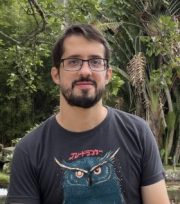SFWA Presents: Get to Know…Our Career Mentorship Program
by the SFWA Publications Crew
Editor’s note: This article is part of the SFWA Presents: Get to Know… series, which includes informational pieces about SFWA programs, committees, and initiatives, and also interviews with the SFWA volunteers who work to support their fellow writers in the industry.
The Career Mentorship Program aims to connect writers who have questions about career development with authors with more or different career experience. The objective is to provide community, share knowledge, and offer networking opportunities, focusing on professional rather than artistic development.
The 2025 cycle of SFWA’s Career Mentorship Program has now kicked off, so what better time to talk with the program’s team about this all-volunteer service, provided free of charge? Applications for would-be mentors and mentees opened on February 8, 2025, in a call that welcomes SFWA members and aspiring members alike. If you miss the February 22 cut-off this time around, please keep checking back for more opportunities in future years. This year’s mentorship period will be March 22–June 22, 2025.
We chatted with the Career Mentorship Program Team (Julia Rios, Sarah Pinsker, A.T. Greenblatt, and Andrea Pawley) to learn more.
The Mentorship Program offers an opportunity for writers to learn from one another through SFWA. What are the guiding principles for this project?
In concordance with the science fiction and fantasy tradition of paying it forward, the program’s goal is to create an informative, nurturing, and diverse environment that will aid in the professional development and community connectedness of emerging or isolated speculative fiction writers, as well as more established writers who would like to gain knowledge and experience outside of their current areas.
Although your team strives to support as many writers as it can, the Mentorship Program cannot guarantee a match for every mentor or mentee applicant. Why is that?
We typically receive far more applicants than it is possible to support. After several rounds of trial and error, we’ve discovered the system functions best when we have a limited set so that our administrator is able to keep up with each pair as needed.
What does a typical Mentorship Program cycle look like, and how long does it last? What kind of commitment should participants expect and prepare for?
A typical mentorship period lasts for three months, and we ask that mentors and mentees try to talk to each other every couple of weeks during that period. We send welcome emails and mid-cycle check-ins with some possible questions and discussion topics. Mentors and mentees can choose to communicate via video chat, voice chat, or text (in chat or email). The goal is for mentees to have a chance to ask any questions they might have about the industry or get help sorting out best practices and scheduling. This is not a critique-based mentorship, but it can be an accountability partnership—or a relationship where the mentee might ask for a mentor’s guidance on how to choose an agent or hone a specific kind of skill in general terms (like plotting or outlining).
Not all mentees are alike. Could you speak more to the range of reasons that a person might seek mentorship throughout their career in SFF?
There are all sorts of reasons a person might want to be a mentee. A newer mentee might want to get advice on how to submit short fiction or novels, while an experienced mentee might want to get advice on how to handle switching to a new agent or breaking into game writing after focusing on novels. We also have mentees who might be interested in moving from traditional publishing to self-publishing or hybrid publishing, and mentees who might be interested in things like learning approaches to organizing their writing while dealing with creative career obstacles like parenthood or ADHD.
The benefits of being a mentor tend to get less press, but what would you say to seasoned writers debating whether now is the right time to contribute in this way?
Our mentors tend to have good Mentorship Program experiences and enjoy getting to know their mentees. It’s also likely that someone who is now a mentor was helped out by another writer in the past. It can be a very rewarding full-circle feeling when a writer has more experience and can pay it forward to the next wave. As to whether now is the right time, the real question is: Do you have a little time every couple of weeks to talk with a mentee this spring? If yes, then the SFWA Mentorship Program could be a great fit! We get mentor and mentee applicants with a wide range of experiences, which means we can make matches at a variety of experience levels.
Setting expectations appropriately is the key to success in most fields. What recommendations would you offer to anyone considering applying as either a mentor or a mentee in this latest SFWA Mentorship Program cycle?
We always make fewer matches than there are applicants, both on the mentor and mentee side, so it is important to note that if you apply and don’t get matched as a mentor or mentee, this is not in any way a personal slight. We choose mentees through a random lottery, and then we try to match them to mentors from the available pool. What this means is that there are always many mentee applicants who aren’t matched, and there are also always mentors who aren’t matched as well. Sometimes, very experienced mentors aren’t matched simply because the exact fit wasn’t in the mentee lottery pool. Additionally, we hope that everyone who does get a match treats their match with respect and comes prepared to share and to ask for what they need. For mentee applicants, it can help a lot if they know, coming in, one area they would most like to focus on.
Thank you, Mentorship Program volunteers, for keeping this connection space thriving!
For more information, please visit the Career Mentorship Program. The latest application cycle runs from February 8 to February 22, 2025, but the team behind the scenes encourages would-be participants not to rush to submit their applications. There are no first-come-first-serve selections! The experienced volunteers who operate this SFWA program will do their best to find good matches for all potential mentors and mentees—and if a match is not found this year, please try again in the next cycle.



